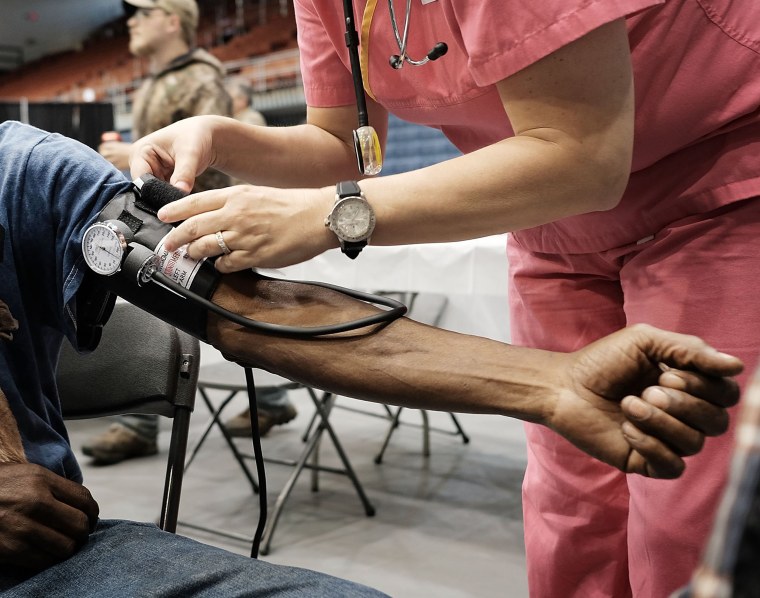An uptick in deaths due to uncontrolled high blood pressure is slowing the progress in the fight against heart disease, according to a study published Tuesday in the Journal of the American Medical Association.
Deaths from heart disease overall have decreased in the past two decades, but the rate of that decline has slowed since 2010, the study found.
In addition to rising rates of deaths related to high blood pressure, rates of heart disease deaths linked to obesity and Type 2 diabetes — once declining — have leveled off.
The findings are worrying, especially given the recent medical and surgical advances in treating heart disease.
"The fact that we are not seeing that translate into improvement in death rates is concerning," study author Dr. Sadiya Khan, a cardiologist at Northwestern Medicine in Chicago, said.
Khan and her colleagues searched a public Centers for Disease Control and Prevention database for death certificates from 1999 to 2017.
Death certificates don't indicate what led to the ultimate cause of death — for example, a person's cause of death may have been a heart attack, but the heart attack could have been caused in part by high blood pressure.
Uncontrolled high blood pressure, both chronic and acute, can contribute to a person's death in a number of ways. "Hypertension that is really out of control could lead to a tear in a blood vessel," said Dr. Deepak Bhatt, executive director of interventional cardiovascular programs at Brigham and Women's Hospital in Boston.
"It could also lead to swelling in the brain, heart attack, stroke, and contribute to heart failure and kidney failure," Bhatt, who was not involved in the current study, said.
Other factors that could lead to heart disease deaths have also become more widespread in the past two decades, including obesity and Type 2 diabetes, Khan said.
The conditions are strongly linked and both are major risk factors for heart disease.
More than 93 million U.S. adults are considered obese, according to the CDC, and almost as many — 84 million — have prediabetes. An additional 30 million Americans have Type 2 diabetes.
We've noticed the leading edge of an emerging re-epidemic.
"Although we have celebrated significant declines in heart disease deaths and stroke over the last several decades, what we've noticed is the leading edge of an emerging re-epidemic," Dr. Laurence Sperling, director of the Emory Heart Disease Prevention Center in Atlanta, said.
Indeed, heart disease remains the nation's No. 1 killer of both men and women — claiming more than 800,000 American lives each year, according to the American Heart Association.
Sperling, who was not involved with this latest study, said the research should serve as a wake-up call.
"We need to be more actionable as opposed to complacent because these curves most likely will continue," he said.
In 2017, in an effort to rein in high blood pressure, the American Heart Association and the American College of Cardiology lowered the threshold for what's considered to be high blood pressure, from 140/90 mm/Hg to 130/80 mm/Hg.
"What we were taught was normal many years ago is now considered high blood pressure," Dr. Ravi Dave, director of interventional cardiology at UCLA Medical Center, Santa Monica, said. He was not involved in the new research.
"We were allowing patients to have higher blood pressure. Now the guidelines are much more strict."
Mounting evidence has shown that when patients can get their blood pressure down to levels below what was previously considered "normal," they greatly reduced their risk for heart attack and stroke.
Awareness and diagnosis are key. Dave said many patients can go years without ever knowing hypertension is taking a toll on their cardiovascular health.
"It's a silent problem," he said. "Most patients don't have symptoms until it gets to be very high."
Lifestyle factors are perhaps the biggest driver of hypertension. The American Heart Association recommends several ways to lower your blood pressure and keep it in a healthy range. Those include:
- eating a well-balanced diet that's low in salt.
- limiting alcohol to two drinks a day for men, one for women.
- exercising about 30 minutes a day, five days a week.
- quitting smoking.
- losing weight if your body mass index is over 25.
The JAMA study also showed racial disparities persist. African Americans had consistently higher cardiovascular death rates than whites.
And it suggested that the country is not on track to meet the heart health goals set by the American Heart Association: to improve cardiovascular health of the U.S. population by 20 percent, and reduce mortality from cardiovascular disease and stroke by 20 percent, by next year.
"The goals ... were bold and ambitious," Dr. Eduardo Sanchez, chief medical officer for prevention at the American Heart Association, wrote in a statement to NBC News.
"We cannot and will not be complacent about recent reductions and plateauing in the rates at which cardiovascular mortality is dropping."
Follow NBC HEALTH on Twitter & Facebook.



